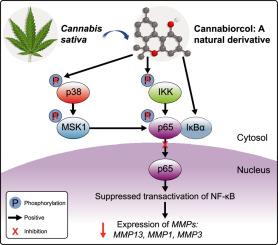Cannabiorcol as a novel inhibitor of the p38/MSK-1/NF-κB signaling pathway, reducing matrix metalloproteinases in osteoarthritis
IF 6.7
1区 医学
Q1 CHEMISTRY, MEDICINAL
引用次数: 0
Abstract
Background
The bioactivity and potential medicinal applications of cannabiorcol, a lesser-known derivative of Cannabis sativa, require further investigation. Osteoarthritis (OA) is a chronic joint condition marked by gradual degradation of the cartilage and commonly associated with elevated levels of matrix metalloproteinases (MMPs). However, the influence of cannabiorcol on OA and its underlying mechanisms remains unclear.
Methods
In silico analysis investigated the key transcription factors that regulate MMP expression. A chondrocyte cell model [interleukin (IL)-1β and IL-1⍺-treated C20A4 cell line] was established and treated with cannabiorcol. Associated cytotoxicity was assessed using a WST-8 assay. A monoiodoacetate-induced OA rat model was established and treated with cannabiorcol. Protein translocation and transactivation analyses were conducted using immunofluorescence and dual-luciferase reporter assays, respectively. Western blotting and real-time PCR analyzed relevant markers to examine cannabiorcol's effects on OA and its fundamental mechanisms.
Results
Cannabiorcol inhibits the expression of IL-1β-induced MMPs compared to other cannabis-related compounds. In silico analysis revealed that the nuclear factor-kappa β (NF-κβ) and mitogen-activated protein kinase (MAPK) pathways are associated with MMP expression as key regulators. In vitro, cannabiorcol inhibits the NF-κB and p38 MAPK pathways independently cannabinoid receptors and transient receptor potential vanilloids. In vivo, cannabiorcol reduces MMP expression and ameliorates monoiodoacetate-induced OA traits in rats.
Conclusion
Cannabiorcol inhibits IL-1β-induced MMP expression in vitro and alleviates OA in an MIA-induced OA rat model by reducing MMP expression and inhibiting the p65/p38 axis.

大麻酚是 p38/MSK-1/NF-κB 信号通路的新型抑制剂,可减少骨关节炎中的基质金属蛋白酶
背景大麻酚是一种不太为人所知的大麻衍生物,其生物活性和潜在的医药应用需要进一步研究。骨关节炎(OA)是一种以软骨逐渐退化为特征的慢性关节疾病,通常与基质金属蛋白酶(MMPs)水平升高有关。然而,大麻醇对 OA 的影响及其内在机制仍不清楚。建立了一个软骨细胞模型[白细胞介素(IL)-1β和IL-1⍺处理的C20A4细胞系],并用大麻酚进行处理。相关的细胞毒性使用 WST-8 试验进行评估。建立了单碘乙酸诱导的 OA 大鼠模型,并用 cannabiorcol 进行治疗。分别使用免疫荧光和双荧光素酶报告分析法进行了蛋白质转位和转录激活分析。结果与其他大麻相关化合物相比,大麻酚能抑制 IL-1β 诱导的 MMPs 的表达。硅学分析表明,核因子卡巴β(NF-κβ)和丝裂原活化蛋白激酶(MAPK)通路作为关键调节因子与 MMP 的表达有关。在体外,大麻醇可独立地抑制 NF-κB 和 p38 MAPK 通路,大麻素受体和瞬时受体电位类香草素。在体内,大麻醇可降低 MMP 的表达,并改善单碘乙酸盐诱导的大鼠 OA 特征。
本文章由计算机程序翻译,如有差异,请以英文原文为准。
求助全文
约1分钟内获得全文
求助全文
来源期刊

Phytomedicine
医学-药学
CiteScore
10.30
自引率
5.10%
发文量
670
审稿时长
91 days
期刊介绍:
Phytomedicine is a therapy-oriented journal that publishes innovative studies on the efficacy, safety, quality, and mechanisms of action of specified plant extracts, phytopharmaceuticals, and their isolated constituents. This includes clinical, pharmacological, pharmacokinetic, and toxicological studies of herbal medicinal products, preparations, and purified compounds with defined and consistent quality, ensuring reproducible pharmacological activity. Founded in 1994, Phytomedicine aims to focus and stimulate research in this field and establish internationally accepted scientific standards for pharmacological studies, proof of clinical efficacy, and safety of phytomedicines.
 求助内容:
求助内容: 应助结果提醒方式:
应助结果提醒方式:


